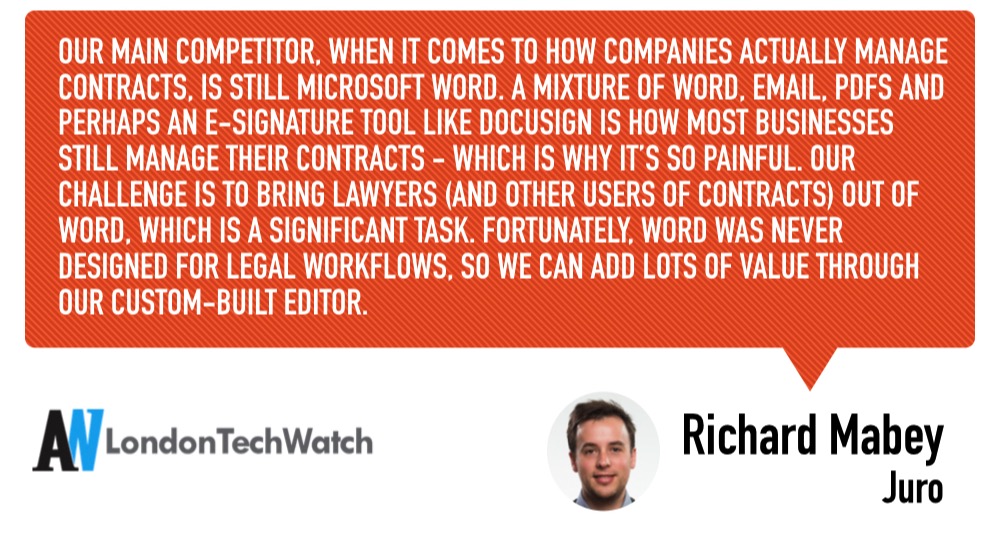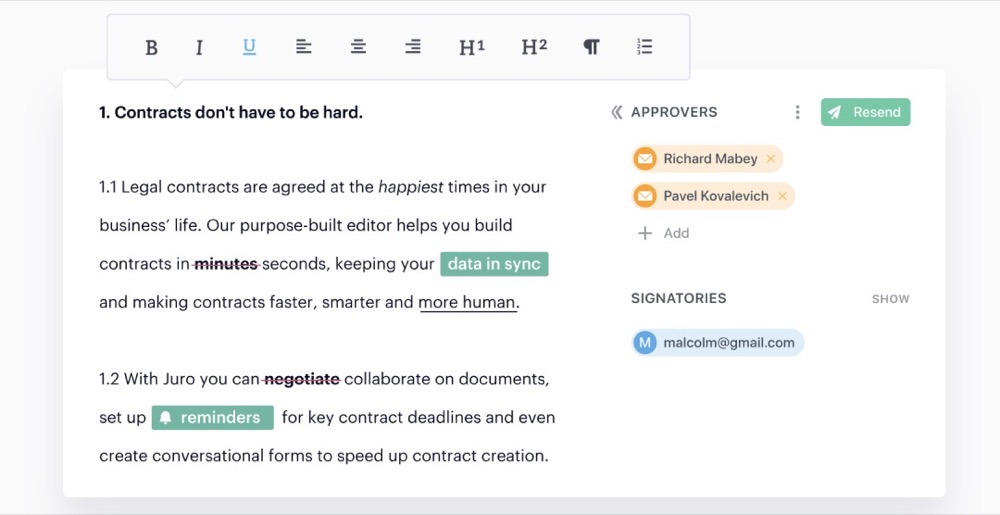There are usually a lot of different parties involved in the negotiation and the creation of a final contract. Juro, the contract management platform, streamlines this process by focusing on all the parties involved including HR, Sales, developers, and legal teams. Juro has helped companies, including Deliveroo’s HR team, with onboarding by disseminating paperwork at record speeds and responsively on mobile devices. Businesses can track their contracts, collaborate, negotiate, & sign contracts in real-time, with Juro serving as a centralized repository.
London TechWatch sat down with CEO and Cofounder Richard Mabey to learn more about Juno’s end-to-end platform, the company’s future plans, and recent funding round, which brings the total funding to $7.8M for the company founded in 2016.
Who were your investors and how much did you raise?
The Series A round was led by Union Square Ventures (USV), but also included some of our existing investors: Point Nine Capital, Seedcamp, Taavet Hinrikus (cofounder of TransferWise) and Paul Forster (cofounder of Indeed).
 Tell us about the product or service that Juro offers.
Tell us about the product or service that Juro offers.
Juro is an end-to-end contract collaboration and management platform that helps businesses create, negotiate, sign, store and manage their contracts, saving 96% of time on the process. The AI-enabled platform also provides insight into contract data, and Juro’s Contract Reader can both store legacy PDF documents and convert them into actionable data – making Juro a single source of truth for contracts.
What inspired the start of Juro?
I was a private practice lawyer, working for Freshfields. I enjoyed the heavy-lifting aspect of the work but was frustrated at how the tech stack we were using seemed to slow us down. Most of our time (and clients’ money) was spent to process – instead of the legal advice we were trained to provide. Word, email, and PDFs seemed to dominate our time, and I wanted to find a solution to that problem. I applied for an MBA at INSEAD and started toying with the concept of Juro there.
How is Juro different?
The biggest differentiator between Juro and other legal tech solutions is our ease of use. Legal tech is often about solutions “by lawyers, for lawyers” … but the majority of people involved in legal process are not lawyers. They’re salespeople, or HR, or homebuyers, or new employees. Instead of focusing on lawyers, Juro is about creating a design-led, user-friendly approach towards contracts, so our platform is intuitive and easy to use for any team managing legal documents within the business.
What market are you targeting and how big is it?
Currently, our focus is on legal, sales and HR teams within high-growth tech companies, because they tend to feel a lot of pain with contract management. Our growth to date suggests there’s a big market with a big appetite for frictionless legal process.
Who do you consider to be your primary competitors?
Our main competitor, when it comes to how companies actually manage contracts, is still Microsoft Word. A mixture of Word, email, PDFs and perhaps an e-signature tool like DocuSign is how most businesses still manage their contracts – which is why it’s so painful. Our challenge is to bring lawyers (and other users of contracts) out of Word, which is a significant task. Fortunately, Word was never designed for legal workflows, so we can add lots of value through our custom-built editor.
What’s your business model?
Our pricing is public on our website, and is transparent: it’s a subscription model, based on the number of users, with different options for larger enterprise deployments, or for users who need an API, Salesforce or Greenhouse integration.
What was the funding process like?
It was challenging and exciting. It’s great to have a partner like USV, with so much experience guiding successful companies like Twitter, Kickstarter, and Etsy. We negotiated and closed the funding round through Juro, which is great validation that our product can handle highly negotiated documents with lots of stakeholders!
What are the biggest challenges that you faced while raising capital?
Finding the right partner is a challenge, simply because there are a lot of investors with different attitudes and objectives. It can also be a huge time drain – every hour you’re out looking for investment is an hour you can’t spend running and growing the company, talking to customers and improving the product, so it’s important to run the process efficiently.
What factors about your business led your investors to write the check?
I’ll let them speak for themselves – John Buttrick, partner at USV, joins our board, and he said:
“We look for founders with products equipped to change an industry. While contract management might not be new, Juro’s transformative vision for it certainly is. There’s no greater proof of the product’s ease of use than the fact that we negotiated and closed the funding round in it. We’re delighted to support Juro’s team in making their vision a reality.”
What are the milestones you plan to achieve in the next six months?
The first priority is to double down on product development so we can deliver our data vision – that means we want to triple the size of our product team in Riga, led by my cofounder Pavel; and we also want to continue to expand our growing customer base in the States and Europe.
The first priority is to double down on product development so we can deliver our data vision.
What advice can you offer companies in London that do not have a fresh injection of capital in the bank?
There aren’t many problems that can’t be solved by spending more time talking to customers, and by hiring the right people.
Where do you see the company going now over the near term?
Well, first of all, we’re moving office, to a bigger space in Clerkenwell, as we ran out of desks some time ago. Similarly, Pavel’s team in Riga will need a much bigger space to accommodate our growth in headcount. Beyond that, while we already have customers on the ground in the US, a physical presence there is inevitable in the near/medium term.
What is your favorite restaurant in London?
I love Orisay – it’s a small Hebridean restaurant in Notting Hill.






